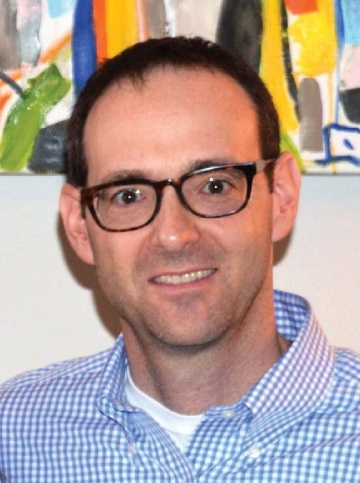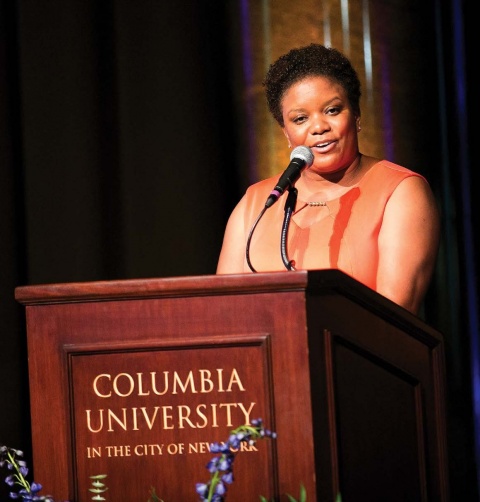Columbia College | Columbia University in the City of New York
Creating Community as a Light in Dark Times

COURTESY TED SCHWEITZER ’91, LAW’94
More importantly, what can we do together, as Columbia College alumni? College lasts only four years, but on average we are alums for more than 60.
I embrace my new role as president of the Columbia College Alumni Association. As this is my first column in CCT, let me introduce myself. I graduated with the great Class of 1991. I blame one too many good times with my classmates for my decision to stay another three years on campus at the Law School. I have been on the CCAA Board of Directors for more than 10 years, focusing on alumni engagement and fundraising.
In times of turmoil we all feel a renewed urgency to promote the ideals of fairness, opportunity and freedom of expression that underpin the University’s mission.
As you know, the College offers one of the most inclusive undergraduate experiences in one of the most diverse cities in the world. Last year 50 percent of Columbia undergraduates received need-based financial aid, at a total of $174 million. Eighteen percent of Columbia students are the first generation in their families to go to college and more than 50 percent of Columbia students self-identify as persons of color. As alumni, we can contribute to their and all students’ experiences through greater engagement with student life and mentoring.
The pandemic has shifted our mindset to a more community-centric one. Each of us is more aware of the greater good, even through the simple gesture of wearing a mask. You can see it daily on sidewalks around the world, and definitely here in New York City. In my CCAA role, I aim to tap into ongoing technological advances, like better digital venues for remote programming, as well as the diverse talents and perspectives of our alumni, to strengthen the College community.
While many of us continue to hunker down in semi-isolation, we try to grapple with questions of injustice in any way we can. We take advantage of new forms of gathering online and the benefits of not commuting, which frees up time. Some of us are suffering loss. Uprooted from our regular routines, we reevaluate what’s important, as time itself presents differently. Did Labor Day just happen, or was it Memorial Day? Imagine being a first-year who jumped from virtual high school graduation to virtual Convocation, Orientation and classes!
In conclusion, I think back to Lit Hum, one of our shared academic experiences. I could quote the lofty Thucydides, Heraclitus or Boccaccio, but instead I turn to the grittier French existentialist Albert Camus. His words on solidarity from his timely novel, The Plague, strike a chord: “No longer were there individual destinies; only a collective destiny, made of plague and emotions shared by all.” Today we too inhabit a time of upheaval and pronounced interconnectedness. We continue to see the College as a source of light in what is now a darkened world. I can’t think of a better time for the CCAA community to reengage more fully and give back. And while we do, let’s not stop roaring!

P.S. I welcome your feedback: tedschweitzer100@gmail.com. Please stay safe.
A CCAA Conversation with Khadijah Sharif-Drinkard ’93

COURTESY KHADIJAH SHARIF-DRINKARD ’93
Khadijah is also an active leader with the CCAA and president of Columbia College Women; her enthusiasm for CC always inspires me. Given the race and social justice issues that currently command our attention, I invited her to have a conversation about these ideas through the perspective of New York City, the College and the Core.
Tell us a little about yourself, both growing up and now. I understand you had connections to Columbia early on.
I grew up just 10 blocks from Columbia, in the Manhattanville Housing Projects. I spent a lot of time on campus with my mom, who would bring my siblings and me — there were six of us — to sit on South Lawn and take in a college setting, and then later in high school at the Double Discovery Center. Today I lead a bicoastal team of attorneys and legal professionals who are charged with acquiring and protecting the intellectual property for ViacomCBS. I am grateful for the experience I had as a Columbia student because it pre- pared me for a world in which I would have to negotiate a number of identities that were ascribed to me as I climbed the ladder to success.
How did the Core Curriculum prepare you to think critically about race and identity?
I had professors who allowed and sometimes encouraged me to explore ideas from Black authors in the context of Core assignments. For example, I juxtaposed Plato’s Republic against Martin Luther King Jr.’s ideas of justice and character of the city-state in his fight for civil rights.
Through the Core I sought to understand the history and experiences of people whose journeys differed from my own, both when studying the texts and in real life with my classmates. It was through the Core that I developed my listening and debating skills. I learned that many of the issues that Black activists raised were not unlike the issues that were raised in the texts written by white males that we were studying. The rights that Greek philosophers espoused are the same rights that we continue to fight for as Black people in this country. I also understood that many civil rights leaders were well versed in the texts that we read, so if I was going to be a critical thinker and offer something constructive in the realm of race and identity, I too needed to understand the Core.
Columbia has frequently convened with thought leaders around issues of race and justice — for example, through the Eric H. Holder Jr. Initiative for Civil and Political Rights, which has the motto “living the Core and advancing justice.” In this climate of tense racial relations, do you see any pitfalls we must avoid as a community that welcomes all voices?
In order for us to “live the Core,” it has to be representative of our diverse experiences because we cannot live that which we cannot see. So, while we aspire to advance justice through our scholarship, actions and debate, there have to be respectful rules of engagement, which entail the civility we are all entitled to when exchanging ideas. I encourage us to lead and speak with empathy. I am a fierce advocate of free speech, but with the freedom to speak is the burden of responsibility for what that speech will do to and for others. Civil debate can be encouraged through exemplifying the best ideals of civil discourse; by showing students, faculty and alumni that we can work together for the greater good of humanity despite our differences.
How can alumni engage in making a society that’s more just, and more equitable?
I believe that it is our duty as alumni leaders to have the difficult conversations in our circles. As president of CCW, I led a board discussion right after the death of George Floyd so that we could all express how we were feeling. I did not want to shy away from this difficult and painful conversation. I wanted to lean into it and have my fellow board members understand how painful it was for me to watch a Black man be murdered in such a cavalier way. And I asked everyone who participated in the discussion to care for one another as we all struggle to understand what this social construct of race has done to our human family.
I also wanted us to acknowledge that there are subtle forms of bias that are at work in our everyday lives. Systemic racism exists in every academy and industry; we have to name it when we see it and be more intentional in order to fight against maintaining the status quo. As graduates of this great institution, we all have a responsibility to fight for a more equitable and just society. We should be doing it on campus, as we share our wisdom and experiences with current students. And we should be doing it in the larger society by making the changes we know need to be made if we are going to collectively win.
For alumni who wish to do more in this arena through the CCAA, what do you recommend?
Alumni should reach out to the CCAA (ccalumni@columbia.edu) to learn how they can become part of the anti-racism work that we are committed to doing. We all have an important role to play as alumni, and one of the key areas is as mentors through the Odyssey Mentoring Program. Imagine if all of our almost 52,000 alumni used their influence and power to help students chart their course; there would be nothing that we could not accomplish together. Although we are still in the midst of a pandemic, there are a number of virtual events that we can participate in with students and fellow alumni like book clubs, panels, “lunch and learns,” and welcome events for new students.
Speaking of mentoring, can you share any advice you would give your two daughters as they navigate growing up in these times?
I want them to know that this is a journey and that there will be pivots and pitfalls along the way — but that is often where we find the greatest lessons and opportunities. Failure is the precursor to any true success.
Issue Contents
Published three times a year by Columbia College for alumni, students, faculty, parents and friends.
Columbia Alumni Center
622 W. 113th St., MC 4530, 6th Fl.
New York, NY 10025
212-851-7852
cct@columbia.edu
Columbia Alumni Center
622 W. 113th St., MC 4530, 4th Fl.
New York, NY 10025
212-851-7488
ccalumni@columbia.edu

